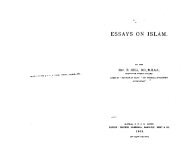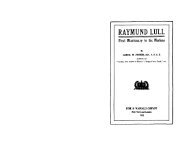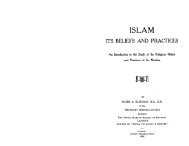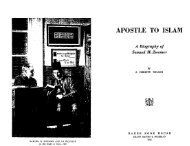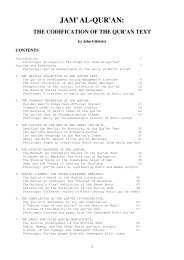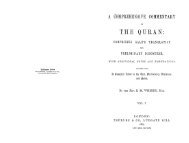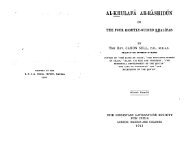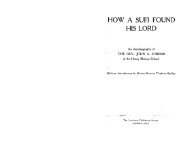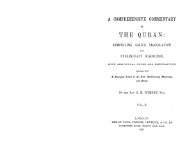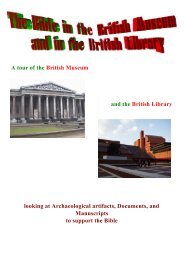Guillaume--Life of Muhammad.pdf - Radical Truth
Guillaume--Life of Muhammad.pdf - Radical Truth
Guillaume--Life of Muhammad.pdf - Radical Truth
Create successful ePaper yourself
Turn your PDF publications into a flip-book with our unique Google optimized e-Paper software.
xxxvi<br />
The <strong>Life</strong> <strong>of</strong> <strong>Muhammad</strong><br />
Abii Mu'iiwiya: A great memory: others confided their traditions to<br />
his memory for safe keeping.<br />
aI- Bukhiiri: AI-Zuhri used to get his knowledge <strong>of</strong> the maghiizi from I.I.<br />
'Abdullah b. Idris al-Audi: was amazed at his learning and <strong>of</strong>ten cited<br />
him.<br />
Mu~'ab:<br />
He was attacked for reasons which had nothing to do with<br />
tradition.<br />
Yazid b. Harlin: Were there asupreme relator <strong>of</strong> tradition it would be 1.1.<br />
Ali b. aI-Madini: His ahadith are sound. He had a great reputation in<br />
Medina. Hisham b. (Urwa's objection to him is no argument against<br />
him. He may indeed have talked to the latter's wife when he was a<br />
young man. His veracity in hadith is self-evident. I know only <strong>of</strong><br />
two that are rejected as unsupported' which no other writer reported.<br />
aI-'Ijli: Trustworthy.<br />
Ya!).ya b. Ma'in: Firm in tradition.<br />
AJ.1mad b. !:Ianbal: Excellent in tradition.<br />
(b) The writer then goes on to state all that has been said against I.I.<br />
Omitting details <strong>of</strong> little significance we are left with the following charges<br />
which 1. Sayyidu'l-Niis goes on to discuss and refute. <strong>Muhammad</strong> b.<br />
'Abdullah b. Numayr said that when 1.1. reported what he had heard from<br />
well-known persons his traditions were good and true, but he sometimes<br />
reported worthless sayings from unknown people. Yal,1ya b. al-Qa\liin<br />
would never quote him. Al,1mad b. !:Ianbal quoted him with approval, and<br />
when it was remarked how excellent the stories (qi~llf) were he smiled in<br />
surprise. His son admitted that Al,imad incorporated many <strong>of</strong> I.I.'s<br />
traditions in his Musnad, but he never paid heed to them. When he was<br />
asked if his father regarded him as an authority on what a Muslim must<br />
or must not do he replied that he did not. He himself would not accept a<br />
tradition which only 1.1. reported. He used to relate a tradition which he<br />
gathered from a number <strong>of</strong> people without indicating who had contributed<br />
its separate parts. I. al-Madini said' that at times he was 'fairly good'.<br />
AI-Maymiini reported that 1. Ma'in 156--233 said he was 'weak', but others<br />
denied that he~aid so. AI-Diiri said he was trustworthy but not to be used<br />
as an authority mfiqh, like Malik and others. AI-Nasa'i said that he was not<br />
strong. AI-Daraqutni said that a tradition from 1.1. on the authority <strong>of</strong> his<br />
father was no legal pro<strong>of</strong>: it could be used only to confirm what was already<br />
held to be binding. Yal,1ya b. Sa'id said that though he knew 1.1. in Kiifa<br />
he abandoned him intentionally and never wrote down traditions on his<br />
authority. Abii Da'iid aI-Tayalisi (131-203) reported that !:Iammad b.<br />
Salima .said that unless necessity demanded it he would not hand on a<br />
tradition from 1.1. When Malik b. Anas mentioned him he said, 'he is one<br />
<strong>of</strong> the antichrists'. When Hisham b. 'Vrwa was told that 1.1. reported<br />
something from Fatima he said, 'the rascal lies ; when did he see my wife?'<br />
I<br />
These probably belong to the Sunan.<br />
Introduction<br />
xxxvii<br />
When Abd~lIah b. A1,lmad told his father <strong>of</strong>this he said that this was not to<br />
be ~eld agamst 1.1.; he thought that he might well have received permission<br />
to InteIVlew her, but he did not know. He added that Malik I'<br />
I Id • 'd h h was alar.<br />
" flS sal t at e talked to Malik about the Maghtizf and how 1.1. had<br />
sald t~at he was their surgeon and he said, 'We drove him from Medina'<br />
Makkl b. Ibrahim sai~ that he a~tended lectures <strong>of</strong> his; he used to dye hi~<br />
~. When he mentIoned traditIOns about the divine attributes he left<br />
~ and never went back. On another occasion he said that when he left<br />
him he had attended twelve lectures <strong>of</strong> his in Ray.<br />
AI-MufaMai b., ?hassiin said th~t he was present when Yazid b. Harlin<br />
~as ~elatmg tradItIons m al-Baqi when a number <strong>of</strong> Medinans were<br />
listen~g. When h~ mentioned U. they withdrew saying: 'Don't tell us<br />
anything that he saId. We know better than he.' Yazid went among them<br />
but they would not listen and so he withdrew.<br />
'<br />
.Abu Da'ud said that he heard Al,1mad b. !:Ianbal say that U. was a man<br />
With alove.<strong>of</strong>traditIon, so that he took other men's writings andincorporated<br />
~em m his Own. Abii 'Abdullah said that he preferred I.I. to Musa b.<br />
Vbayda aI-Ra~adht AJ.1m~d said that he used to relate traditions as though<br />
from a com~anIOn Without mtermediaries, while in Ibrahim b. Sa'd's book<br />
w?e~ the~e IS a tradition he said'A told me' and when that was not so he<br />
Sald A said'.<br />
Abu 'Abdullah said.that 1.1. came to Baghdad and paid no attention to<br />
those ~ho related hadlth from al-Kalbi and others saying that he was no<br />
auth.<strong>of</strong>lty. AI-F~lliis (d. 249) said that after being with Wahb b. Jarir<br />
readmg before him the maghiizi book which his father' had got from 1.1.<br />
w,e met Ya\>ya b. Qalliin who said that we had brought a pack <strong>of</strong> lies from<br />
hIm.<br />
Al,1mad b. ,!:Ianbal said that in magluizi and such matters what 1.1. said<br />
could be WrItten down; but in legal matters further confirmation was<br />
~ec:ssary. In spit~ <strong>of</strong> the large number <strong>of</strong> traditions without a proper<br />
lS1lad he thought hIghly <strong>of</strong> hIm as long as he said'A told us' 'B informed<br />
me', and II heard:. ~..Ma·i~ did not like to use him as a~ authority in<br />
legal matters. ,,?:bu !:Iatlm said that he was weak in tradition yet preferable<br />
to Afla!).. b. Sa Id.and ~IS tradItIOns could be written down. Sulayman<br />
aI-Tayml ~alled .hlm a har and Ya\>ya al-Qallan said that he could only<br />
ab~?on hIS hadlth t? Go~; he was a liar, When Ya\>ya asked WuliaYb b.<br />
Khahd what made htm thmk that 1.1. was a liar he said that Malik Swore<br />
that he wa,S and he gave as his reason Hisham b. 'Vrwa's oath to that effect.<br />
Tht I~tter s reason ,,:as th,at he reported traditions from his wife Fatima.<br />
Abu .B~r aI-Khatib saId that some authorities accepted his traditions<br />
as provldmg pro<strong>of</strong> for legal precedent while others did not. Among the<br />
reasOns for r~jecting his authority was that he was a Shi'i, that he was said<br />
to hold t.he vIew that man had free will, and that his isniids were defective.<br />
As for hIS truthfulness, it could not be denied.<br />
1 See No.8.



